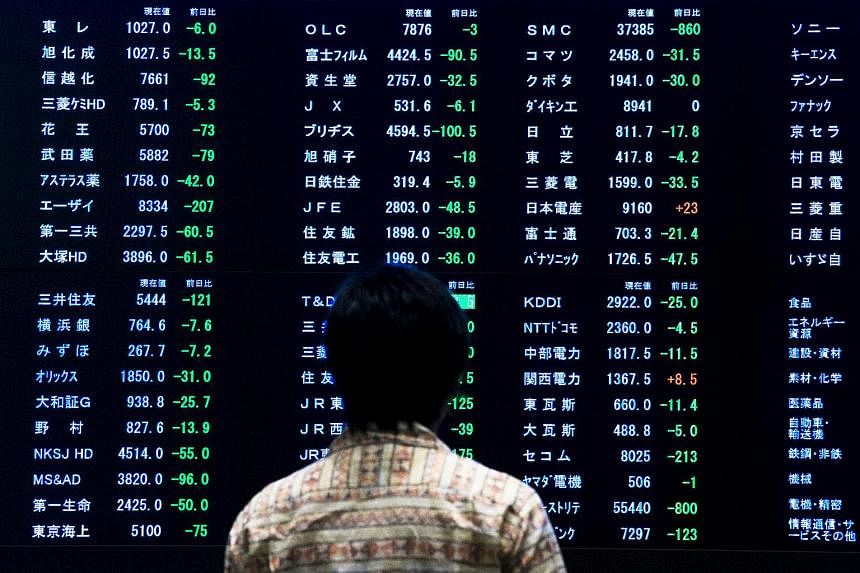WELLINGTON (Bloomberg) - Asian stocks climbed with U.S. index futures following the worst selloff in global equities since 2013 as investors weighed the developments in Greece's debt crisis. The euro retreated amid its best quarter in four years.
The MSCI Asia Pacific Index added 0.2 per cent by 10:08 a.m. in Tokyo, rising from a three-month low as Australian and Korean shares climbed and Japanese equity volatility receded. Standard & Poor's 500 Index futures rose 0.2 per cent following the gauge's worst day since April 2014. The euro was at US$1.1200 after erasing a 1.9 per cent tumble Monday to end the day up 0.6 pe rcent. Emerging-market currencies rallied. Debt from the U.S. to Australia and Japan was steady after advancing last session.
Global stocks sank to a three-month low Monday, while haven assets soared as the Greek premier's unexpected decision to put creditors' demands to a referendum plunged the nation into turmoil. The focus Tuesday shifts to whether Greece will default, with a 1.5 billion euro payment to the International Monetary Fund due. Chinese equities are in a bear market, with policy easing failing to stem an exodus by leveraged investors.
"Right now the biggest surprise is that the euro is not materially weaker," said Matthew Sherwood, head of investment markets research in Sydney at Perpetual Ltd. "Market expectations are that the Greek situation is manageable even if they exit the union. All eyes this week will be on the ECB, which has the potential to announce a front loading of its QE program if the upward trend in periphery bond yields persists."
While Treasuries and German bunds jumped Monday amid demand for low-risk, haven assets, debt from Portugual to Italy, Bulgaria and Romania fell amid concern those countries' banking industries would be rocked should Greece exit the euro bloc.
Yields on 10-year Treasury notes were little changed Monday at 2.32 per cent, following the previous session's 15 basis-point plunge, while similar maturity Japanese debt held at 0.45 per cent after rates dropped two basis points. Australian bonds due in a decade yielded 2.95 per cent after sliding 10 basis points Monday.
While Greece's game of brinkmanship continued Monday - with Prime Minister Alexis Tsipras claiming regional leaders didn't have the nerve to kick them out of the euro - a European central banker indicated a way could still be found to keep the currency bloc intact.
Should voters vote 'yes' in Sunday's referendum, "I have no doubt about the fact that the authorities of the eurozone will find the means, under one form or another, to honor their commitments," European Central Bank Executive Board member Benoit Coeure said in an interview with Les Echos published late Monday. There were also reports German Finance Minister Wolfgang Schaeuble told lawmakers he doesn't view Greece as a contagion risk for the rest of the euro area.
The euro lost 0.3 per cent against the dollar and fell 0.4 per cent to the yen Tuesday. The 19-nation currency is still on track for a 4.4 per cent advance versus the greenback in the three months to June 30, its best quarterly performance since 2011.
Australia's S&P/ASX 200 Index rose 0.2 per cent following a three-day retreat. The Kospi index in Seoul was up 0.1 per cent, swelling its second straight quarterly gain to 1 per cent.
Japanese stocks swung between gains and losses, with the Nikkei 225 Stock Average Volatility Index down 8.4 per cent after surging 29 per cent Monday, the most since August. The Nikkei 225 is up 5 per cent this quarter, set for a fifth straight advance after touching an almost 19-year high last week.
The Korean won and Malaysian ringgit gained at least 0.2 per cent, while New Zealand's dollar extended losses near a five-year low, dropping 0.4 per cent.

